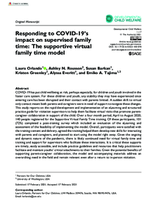Abstract
COVID-19 has put child wellbeing at risk, perhaps especially, for children and youth involved in the foster care system. For these children and youth, any stability they may have experienced since entering care has been disrupted and their contact with parents limited. A sudden shift to virtual only contact meant both parents and caregivers were in need of support to navigate these changes. This study reports on the rapid development and implementation of an eLearning and structured practice guide for visitation supervisors to help them facilitate virtual visits that promote parent-caregiver collaboration in support of the child. Over a four month period, April to August 2020, 140 people registered for the Supportive Virtual Family Time training. Of these participants, 101 (72%) completed a post-training survey which included an evaluation of the eLearning and assessment of the feasibility of implementing the model. Overall, participants were satisfied with the training content and delivery, agreed the training helped them develop new skills for interacting with parents and caregivers, and planned to start using the model right away. Given the ongoing and dynamic nature of the pandemic, there is likely continued need for virtual family time and training and support for supervisors who facilitate these interactions. It is critical these supports are timely, easily accessible, and include practice guidelines and resources that help practitioners facilitate and maintain youths’ critical attachments to their families. Given the potential benefits of supporting parent-caregiver collaboration, the model and accompanying materials address an overarching need in the field and remain relevant even after a return to in-person visitation.

